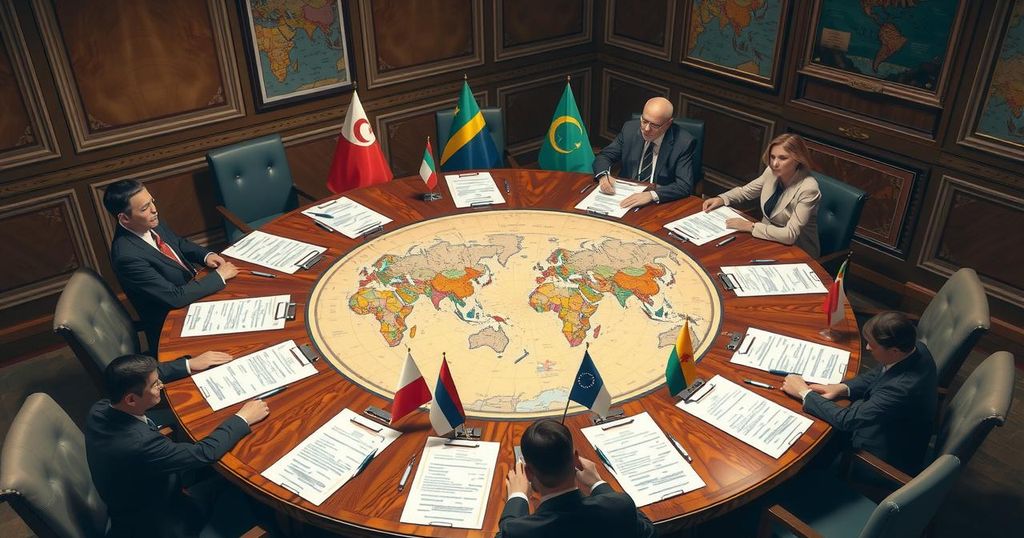Russia’s Diplomatic Insights: Navigating Global Crises and the Role of Saudi Arabia

Dmitry Polyanskiy criticized U.S. diplomatic strategies that escalated the Ukraine conflict, contrasting them with the Trump’s administration’s approach. He praised Saudi Arabia’s emerging role as a diplomatic hub and reiterated Russia’s support for Palestinian rights amid other regional crises. Polyanskiy’s remarks reflect the complexities of international relations and the need for a balanced approach to global conflicts.
The recent remarks by Dmitry Polyanskiy, Russia’s first deputy permanent representative to the UN, highlight the complexities surrounding the Ukraine conflict and the global diplomatic landscape. During an interview on the Arab News show “Frankly Speaking,” he critiqued the previous U.S. administration, asserting it exacerbated tensions with Russia instead of fostering resolution. He noted, “The previous (American) administration was unfortunately part of the problem, not part of the solution,” emphasizing that its actions provoked significant repercussions for Ukraine.
Polyanskiy attributed the escalation of the conflict to Washington’s strategies, suggesting that the Biden administration’s approach continued to fuel the war against Russia. He contrasted this with the diplomacy of the Trump administration, stating, “The Trump administration views it absolutely differently, and this is the right approach.” He expressed that a shift in diplomatic strategy is crucial, as evidenced by recent talks in Riyadh that could position Saudi Arabia as an emerging diplomatic hub.
The discussions included proposals for a ceasefire over the Black Sea and the easing of sanctions on Russia, signifying Saudi Arabia’s potential to play a central role in international diplomacy. Polyanskiy appreciated Saudi Arabia’s proactive stance, stating, “Our Saudi brothers behaved in a very, very positive way,” and forecasted that Riyadh could significantly influence negotiations regarding the Russia-Ukraine conflict.
Regarding the broader implications for global crises, Polyanskiy discussed Russia’s position on the Middle East, specifically the ongoing conflict in Gaza. He reiterated Russia’s stance supporting Palestinian rights and a two-state solution but acknowledged that Moscow’s leverage over Israel is limited compared to that of the U.S. He stated, “It’s hard for us to put pressure on Israel,” emphasizing the importance of unified action from Arab nations.
Polyanskiy criticized past U.S. mediation efforts in the Israeli-Palestinian context for neglecting the Palestinian issue, highlighting the necessity of returning to a more balanced approach. He maintained that the international community must prioritize the Palestinian cause to facilitate lasting peace in the region.
Turning to the Sudan conflict, Polyanskiy projected support for the Sudanese authorities amidst ongoing violence and upheaval. He pointed out that Russia stands firmly with the Sudanese government, advocating for a distinction between the government and paramilitary factions. Despite humanitarian challenges, he asserted that food distribution issues should not be politicized against the government.
Discussing the situation in Syria, Polyanskiy reiterated Russia’s commitment to a peaceful resolution and cooperation with Syrian authorities while maintaining long-standing friendships with the Syrian people. He emphasized the need for inclusive governance in Syria that adequately addresses terrorism without discussing hypothetical scenarios regarding Assad’s future.
In conclusion, the remarks of Dmitry Polyanskiy illuminate the nuances of international relations and conflict resolution in complex geopolitical landscapes. His insights reflect Russia’s strategic perspectives on pivotal crises and diplomatic engagements, emphasizing collaboration, realism, and the importance of a balanced approach in addressing conflicts across the globe.
Dmitry Polyanskiy’s insights shed light on the intricate web of global diplomacy, particularly regarding the Ukraine conflict and Middle Eastern crises. His critique of U.S. policies showcases a significant shift in international perspectives, emphasizing the emerging role of Saudi Arabia in diplomacy. The necessity for a balanced approach to critical issues such as the Palestinian cause and the ongoing conflicts in Sudan and Syria underscores the importance of collaborative efforts among global powers to foster peace and resolution.
Original Source: www.arabnews.com






